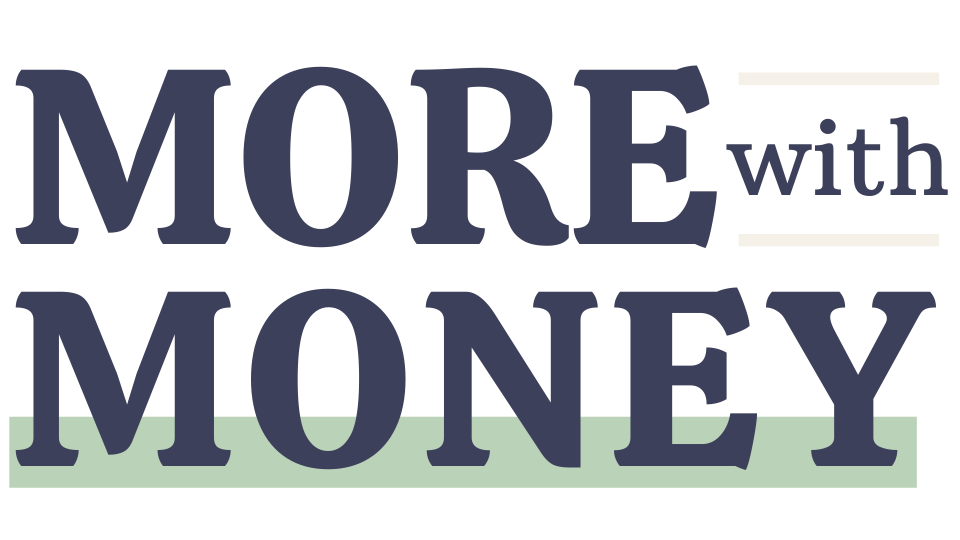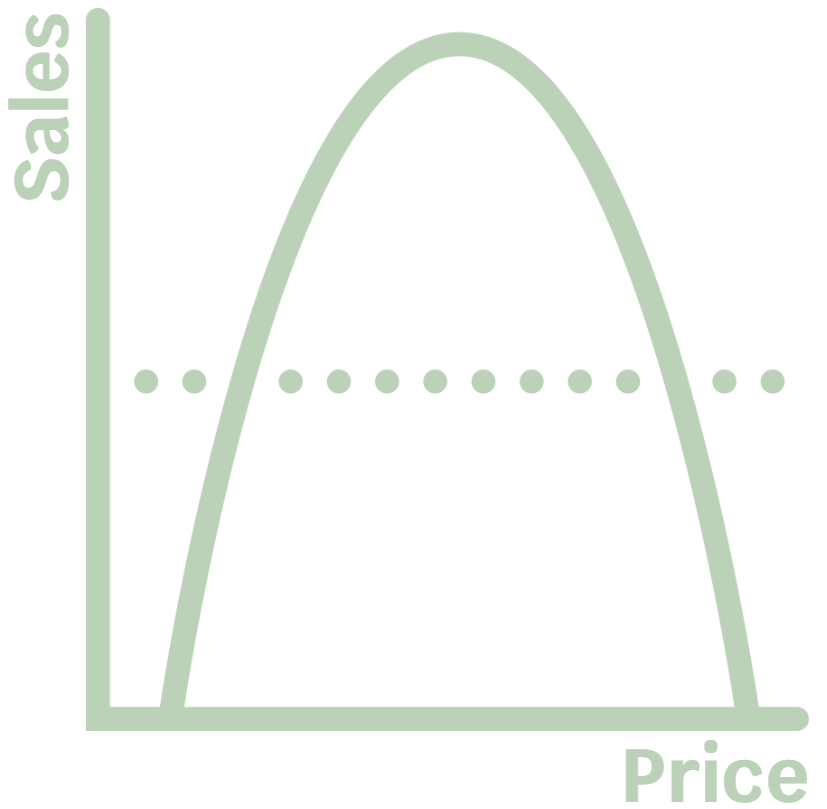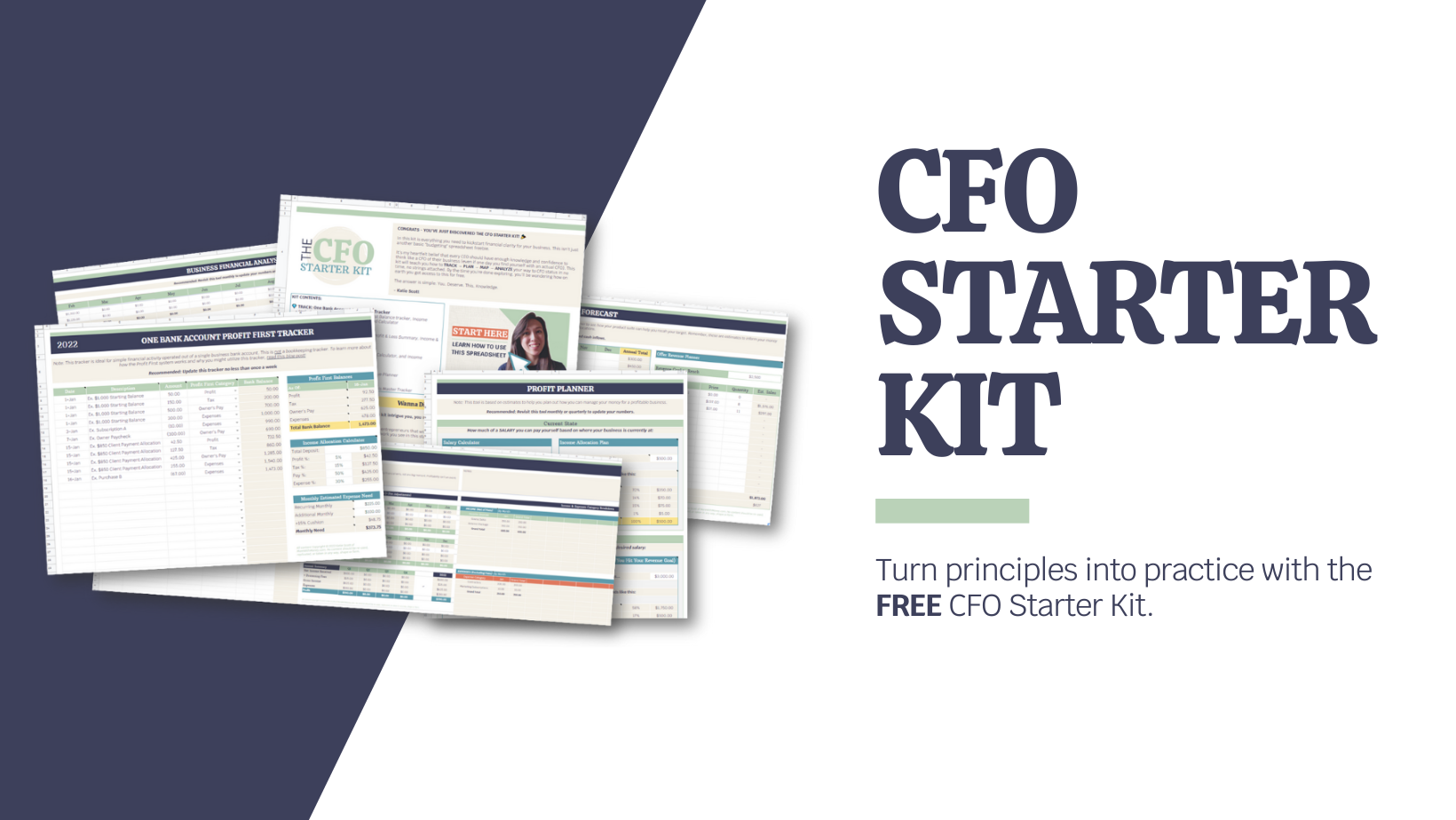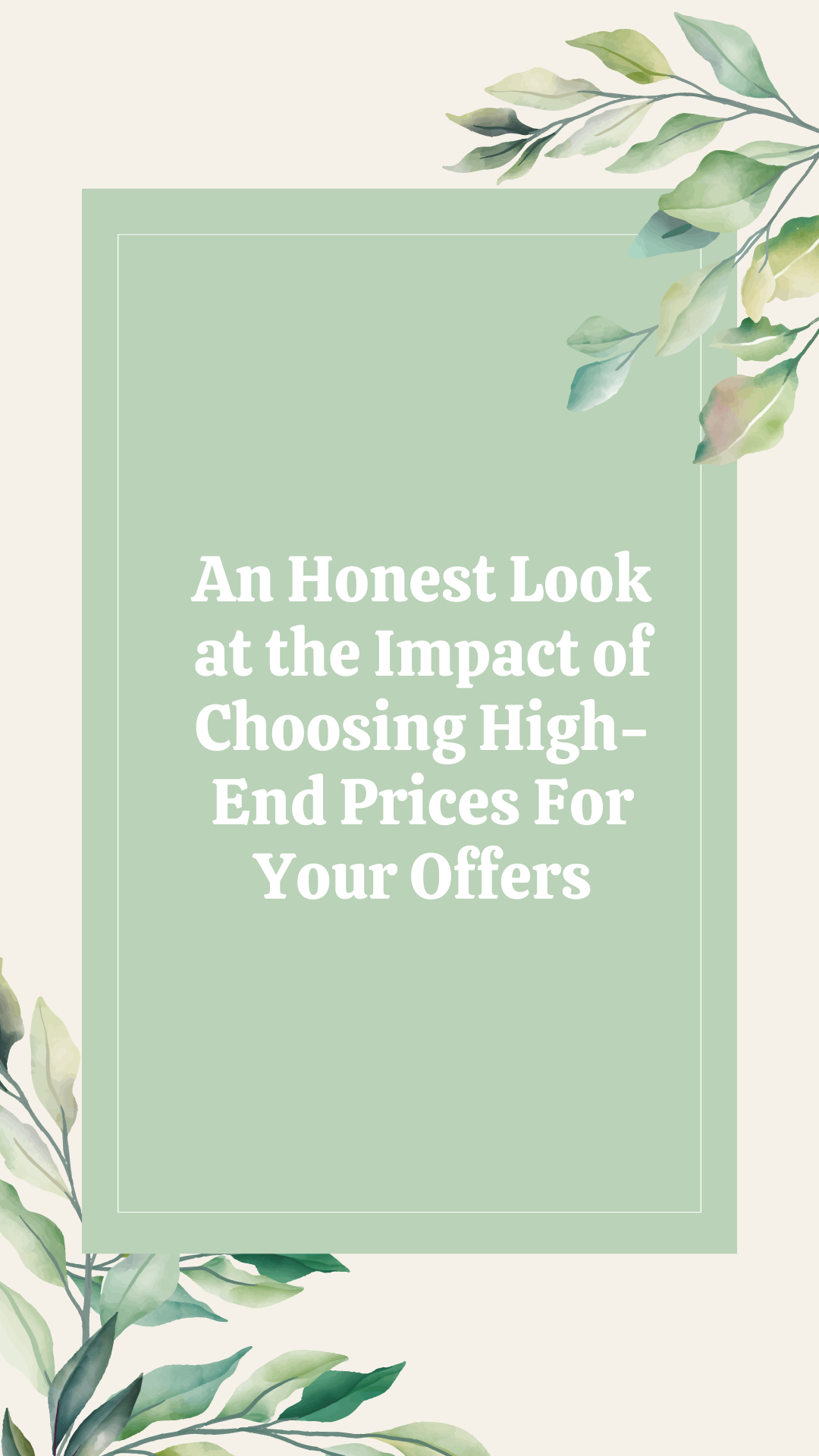An Honest Look at the Impact of Choosing High-End Prices For Your Offers
Settling on a price to charge for your offers can feel like both a numbers game and an emotional drain. While we often hear the advice to raise our prices, is that really the best way? In this post, we're going to analyze the pros and cons of pricing your offers on the high-end.
Reasons to Price Higher
First of all, let’s discuss the reasons you actually might want to price your offers on the higher-end.
Reason #1: You have a high value offer.
I would describe a high value offer as one that provides a real, tangible solution with a desired and proven “return” on the buyer’s investment. For offers such as these, it makes sense to see a higher price point to reflect what is being given in exchange.
If you think about it, certain “costs” were incurred to provide such a valuable offer that should be covered by the revenue that offer generates. Yes, sometimes something as direct as cost of materials or labor to create that offer. Other times, the price you pay is for the years of experience or education that went into formulating the solution being paid for.
Reason #2: You want to increase buyer commitment.
Higher value offers are rarely “quick win” solutions. They typically require that your buyers meets you somewhere in the middle by committing to do the work to USE your solution to get results.
Whether I buy a $100 vacuum or a $1,200 vacuum, if I never actually vacuum my house, I won’t have clean floors. (Can you tell I’m procrastinating vacuuming my floors? 👀)
Higher pricing can sometimes (though not always) naturally generate this motivation simply due to a desire to make the purchase a worthwhile investment. At the very least, the people who end up making the investment are more likely to be “serious” about showing up the way you need them to.
Reason #3: You’ve created a premium, sometimes exclusive, experience.
Higher pricing can communicate and cultivate a premium, sometimes even exclusive, experience. It’s almost like the difference between a free Facebook group community vs. a yacht club.
Not only does higher pricing help you to maintain that level of exclusivity (and, as we just discussed, buyer commitment), but it can also help to communicate this to interested buyers. It’s a marketing message in and of itself. Research over the years has shown that consumers associate higher price with higher quality, which can be important to consider if you’re aiming to construct a “premium brand identity.”
Reason #4: You want to drive higher earnings on fewer sales.
You may have also heard this described as increasing your “average order value,” that is, the average dollar amount generated per individual “order” or purchase of your offer(s) in a single transaction.
Mathematically speaking, if you raise your price of one offer, you’re going to be able to earn more on a sale of that one offer. Many business coaches will tell you that this is the key to increasing revenue: raise your prices so you don’t need as many sales to hit your goals.
While this is certainly true, it is worth warning that it’s not always this simple. The reality of this approach depends heavily on your sales and marketing strategies, audience, branding, etc. At some point, the increase in sales that you see from increasing your prices turns back the other way. However, with a balanced approach and a deep understanding of your market, you can certainly generate higher revenue off of fewer quantities of sales.
Excuses for Pricing Higher
As we’ve just established, there are completely valid and strategic reasons for choosing higher prices for your offer(s). However, there are also excuses that we are often tempted to use as justification for our overpricing that can directly harm our businesses and our audience.
Excuse #1: Seeking validation.
Believe it or not, imposter syndrome exists on both ends of the pricing spectrum. Setting high prices that your audience may or may not actually pay can sometimes be rooted in a desire to feel validated as a business owner - and I’m speaking from experience on this one.
With the way “premium pricing” is pushed on us in the online business space, it can often feel as though the only way to be a “real” entrepreneur or the only way to show just how “committed” you are to your business is to make your offers worth a lot of money (regardless of whether they have the value to back it up yet).
Whether or not people will pay your higher prices is not a good place to find your sense of self-worth as an entrepreneur.
Tip: As lovely a surprise as this might be, this really should NOT be you after someone’s paid you a premium for your “expertise.” 😂
Excuse #2: Comparing yourself to someone else.
Another reason we may arbitrarily or unjustifiably set higher prices is if we’re simply doing what everyone else is doing.
We’ve all been there. It’s really hard not to jump on the entrepreneurial bandwagon when you see certain trends or ideas among your peers or competitors. Especially if you catch a glimpse of the amount of money they’re (supposedly) making from certain offers or price points.
There’s even some wisdom to seeing what your “competition” is doing and what prices they’re charging for what are perceivably similar offers; that’s a type of market research and it can be very informative!
However, you absolutely have to take the time to differentiate yourself and objectively assess the value of YOUR offer to determine price. Any number of factors could have gone into why Jane Smith over there is able to charge $10k for a course… and some of those factors may not even be justifiable themselves.
Excuse #3: Focusing on revenue, not value.
As we’ve already discussed, charging more for a single offer to make more money with less effort is an over-simplified philosophy pushed by business coaches. However, the message is enticing and it still traps a lot of us.
I can’t even tell you how many pricing calculators and “formulas” I’ve seen from business teachers that are just some variation of:
How much do you want to make in total ÷ How much do you want to sell = Price
Some of these calculators jazz it up more with other factors such as how many hours you want to work a week, but in the end, the approach is the same: Setting prices based on how much money you want to make, rather than a fair assessment of the market value of your offer.
******************************************************************There are so many more pitfalls with arbitrary high-end pricing, and you can read about them here: Let's STOP "Charge What You're Worth" Pricing Culture!
The Problems With Pricing Too High
By falling victim to any of the “excuses” above (or any others that may cause you to unjustifiably overprice your offers), you run the risk of serious misalignment. This misalignment can have multiple effects on your business.
If your prices aren’t aligned with how you feel, you’re going to struggle to sell and serve at this level. It doesn’t matter what math did or didn’t go into your price. If you don’t feel confident selling at that price, you won’t successfully sell at that price. Your audience will pick up on your fear and self-doubt in how you sell, and they won’t feel confident in investing.
If your prices aren’t aligned with your market, they’re going to struggle to be able to buy your offer (or, they’ll buy but immediately have regrets due to their personal financial constraints). The solution isn’t to try more ambush-style sales tactics to capture their payment information on the sales call or to “coach them through” their pricing sales objections (which is often code for pressuring them to ignore their instincts). The solution is realistically and innovatively meeting their needs, if that’s the market you truly feel called to serve.
If your prices aren’t aligned with your offer, your buyers will be disappointed by what they get. This may be reflected back to you through low course completion rates, low engagement, limited positive feedback, potential negative feedback, no superfan advocates and repeat buyers, and worst-case: People spreading the word to NOT invest with you.
So, Should You Price High?
In this post, we’ve looked at both sides of the premium-pricing situation. As we’ve seen, there are perfectly valid and strategic reasons to price your offers higher. But we’ve also seen that there are many pitfalls and consequences to pricing too high for the wrong reasons.
By simply checking your motivations using what we’ve discussed, you’ll probably be able to tell where you land on that spectrum.
But if you want to dig deeper into both the financial and mental side of pricing, then click here to check out the other posts we have in the Price Your Offer series!
Are you ready to take your financial journey to the next level? Then you may be ready to check out the More With Money Academy!
This ever-growing collection of online courses and trainings are specially designed to support entrepreneurs like you on your path to financial wellness. The Academy contains carefully designed courses that are easy to understand and implement so that you can be empowered with the practical concepts, streamlined systems, and powerful mindset to transform your business and personal finances.
Pin for later
I'd love to continue the conversation in the comments! Feel free to share your thoughts.
Until next time!












